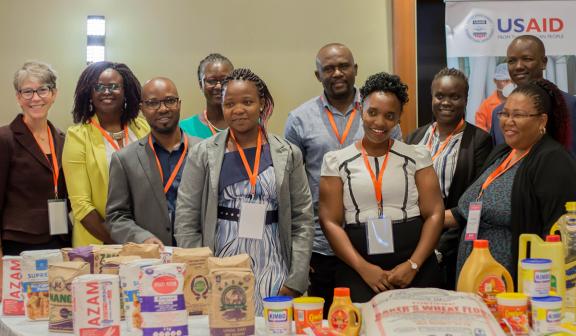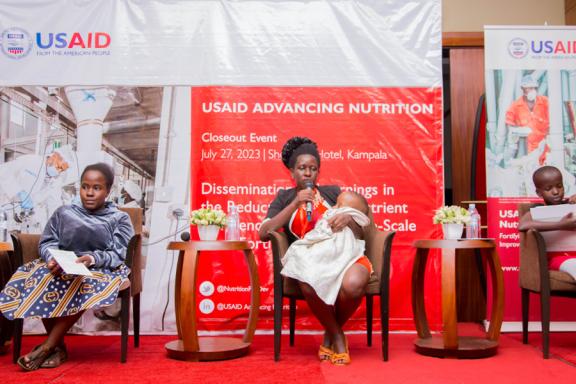
On July 27, 2023, USAID Advancing Nutrition Uganda hosted a closeout event to mark the end of the project, celebrating two years of collaboration with the government of Uganda and key stakeholders to strengthen the food fortification program for salt, wheat flour, maize flour, and edible oils and fats. With over 80 participants joining in person in Kampala and 60 watching the live stream on LinkedIn, the event focused on sharing key achievements and learning in reducing micronutrient deficiencies through large-scale food fortification, a high impact intervention to reduce micronutrient inadequacies. Attendees included USAID Mission officials in Uganda, and National Working Group on Food Fortification (NWGFF) members, including various government ministries, departments and agencies, academia, the private sector, civil society, and USAID implementing partners.
Sarah Ngalombi, Senior Nutritionist at the Ministry of Health and Coordinator for the NWGFF, commended USAID Advancing Nutrition for supporting the coordination of the NWGFF and key institutions in the implementation of their roles and mandates in the food fortification program. Pauline Ketty Okello, Chief of Party for USAID Advancing Nutrition Uganda, highlighted the strategic approaches and targeted interventions undertaken by the project, emphasizing joint planning and implementation as fundamental to cultivating ownership for sustained investments in the food fortification program.
Heather Danton, USAID Advancing Nutrition Project Director, praised Uganda's multidisciplinary approach in contributing to global guidance for strengthening multisectoral engagements and collaboration to ensure safe and affordable access to micronutrient-enriched foods. Speaking on behalf of the USAID Mission in Uganda, Rhobbinah Ssempebwa reaffirmed USAID's commitment and ongoing investments in nutrition interventions to sustain gains over the years and to further improve the health and well-being of thousands of Ugandans.
In his keynote speech as the Chief Guest, Dr. Henry Mwebesa, Director General of Health Services at the Ministry of Health, reaffirmed the government's long-standing commitment to the food fortification program since the enactment of the Food and Drug Act in 1959. He expressed gratitude for USAID's support and highlighted the Government of Uganda’s dedication to the World Health Assembly's resolution on preventing micronutrient deficiencies through investments in LSFF.
Deputy Chief of Party for USAID Advancing Nutrition Uganda Nancy Adero emphasized that despite the COVID-19 challenges and tight timelines, the project managed to achieve significant milestones such as conducting a landscape analysis of food fortification, a capacity strengthening plan for institutional and NWGFF functions, and a capacity needs assessment for 58 food industries. USAID Advancing Nutrition also supported training for 36 master trainers and 132 personnel from 28 food industries to enhance private sector capacity to comply with food fortification standards. Additionally, the project sensitized 34 industry associations on large-scale food fortification and documented potential business models for food fortification.

The National Coordinator of Spina Bifida and Hydrocephalus Association in Uganda and a panelist of children living with spina bifida and hydrocephalus shared the socioeconomic cost of micronutrient deficiencies and called on everyone to embrace food fortification and dietary diversity as a preventive measure.
The NWGFF will carry forward key strategic actions to sustain food fortification gains, with working with ministry departments and agencies to integrate food fortification activities into their workplans and budgets and harmonize the roles and mandates among regulatory bodies to strengthen the food fortification program.